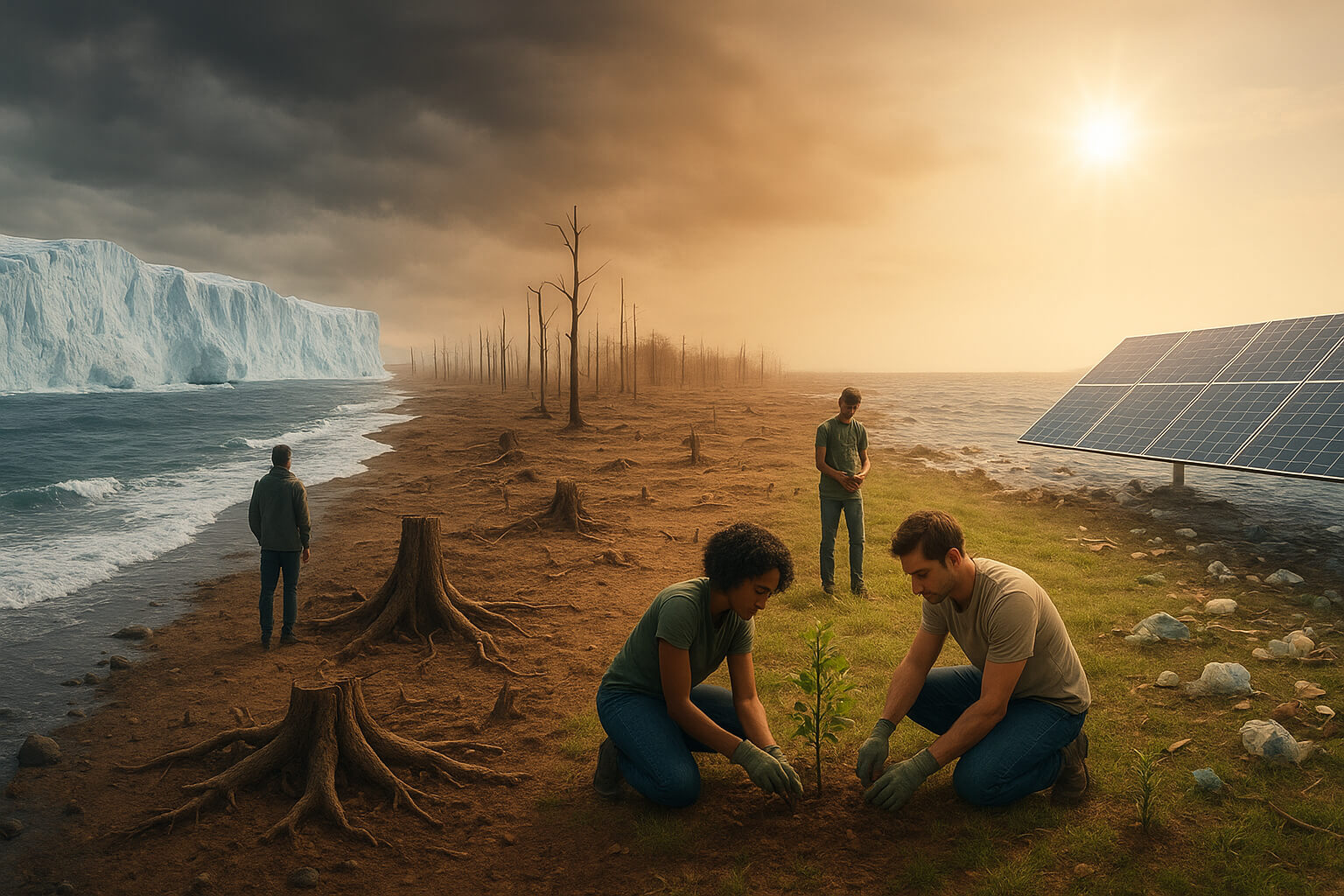What is Climate Change and Why Should You Care?

Climate change is arguably the most pressing issue facing humanity today. From rising global temperatures to increasingly severe weather events, its effects are undeniable. While the complexity of the issue may seem overwhelming, understanding how climate change impacts our daily lives is the first step toward creating meaningful solutions.
What is Climate Change?
- Climate change refers to long-term changes in the average weather patterns of the Earth, primarily driven by human activities. The burning of fossil fuels such as coal, oil, and natural gas releases greenhouse gases (GHGs) like carbon dioxide (CO₂), methane (CH₄), and nitrous oxide (N₂O) into the atmosphere, trapping heat and causing the planet's temperature to rise.
- Since the late 19th century, the Earth's average temperature has increased by more than 1.1°C, and while this may sound modest, even small temperature changes can have profound effects on the environment, ecosystems, and human society.
- For an in-depth look at the science and consequences of climate change, check out What is Climate Change and Why Should You Care?.
Oceans: The Silent Victim
The oceans, which act as Earth's natural heat buffer, absorb nearly 90% of the excess heat produced by climate change. But this absorption comes with its own set of problems:
- Coral bleaching: As ocean temperatures rise, coral reefs lose their vibrant colors and become more vulnerable to disease, impacting marine biodiversity.
- Sea-level rise: Melting ice sheets and glaciers are causing the ocean to rise, putting coastal communities and cities at risk of flooding.
- Ocean acidification: Increased carbon dioxide in the atmosphere is absorbed by the oceans, lowering the pH levels and making it harder for marine life like shellfish to survive.
Another major concern is plastic pollution, which has permeated almost every part of the world's oceans. If current trends continue, by 2050, there could be more plastic in the oceans than fish [National Geographic].
For more on ocean pollution and the importance of recycling, see The Impact of Plastic Pollution on Our Oceans.
The Daily Impact of Climate Change
While climate change is often associated with distant events like melting glaciers, its effects are much closer to home.
Food Security
- Shifting rainfall patterns, rising temperatures, and increasingly frequent droughts threaten global food production. The FAO estimates that agricultural productivity could decrease by as much as 30% by 2050 unless significant climate action is taken [FAO Report].
Water Scarcity
- Rising temperatures are exacerbating water scarcity, leading to more severe droughts and reducing the availability of fresh water. This is a critical issue for millions who rely on agriculture and access to clean water for survival.
- For a closer look at water scarcity, check out Water Scarcity: A Growing Global Crisis.
Health Risks
- Climate change is directly impacting human health by worsening air quality, facilitating the spread of diseases like malaria and dengue, and increasing the frequency of heat-related illnesses. Vulnerable populations, such as children and the elderly, face the highest risks.
The Role of Waste and Consumption
- Waste mismanagement is a significant, yet often overlooked, contributor to climate change. Landfills are responsible for generating large amounts of methane, a potent greenhouse gas.
- One effective way to mitigate this is composting. By turning food scraps into rich, fertile soil, we can reduce landfill waste and the methane emissions associated with it. Learn more in The Importance of Composting.
- Food waste is another major concern. One-third of all food produced worldwide is wasted, contributing not only to greenhouse gas emissions but also to the depletion of resources like water and land. Reducing food waste, supporting local farmers, and making mindful purchases can go a long way in tackling this problem.
What You Can Do at Home
Making small, sustainable changes at home can add up to a significant collective impact. Here are some ways to reduce your carbon footprint:
- Cut energy consumption: Start with a home energy audit to find easy ways to save energy.
- Conserve water: Fixing leaks, installing water-saving devices, and planting eco-friendly gardens are simple but effective ways to reduce water usage. Check out How to Reduce Your Water Usage at Home.
- Rethink consumption: Opt for reusable products, limit single-use plastics, and support businesses committed to sustainability.
- Offset your emissions: Contribute to carbon offset initiatives that help balance the emissions you can't avoid. Learn more in Understanding Carbon Offsetting.
Global Responsibility: Why Your Voice Matters
Combating climate change requires a collective effort. While governments, corporations, and global organizations must lead, individuals play a critical role. Public demand for policy changes—whether through voting, activism, or responsible consumer choices—helps create pressure for climate action.
Supporting sustainability initiatives in your community or donating to environmental organizations working toward climate solutions can also make a difference.
Conclusion: Why It Matters
- Climate change is not just an environmental issue—it is a human issue that affects everything from the food we eat to the air we breathe. The impacts are already here, and they are only expected to intensify. By making informed decisions, advocating for systemic change, and taking action in our daily lives, we can collectively contribute to a more sustainable, livable future.
- The truth is clear: we cannot afford to ignore climate change. The future of our planet and future generations depends on what we do today.
